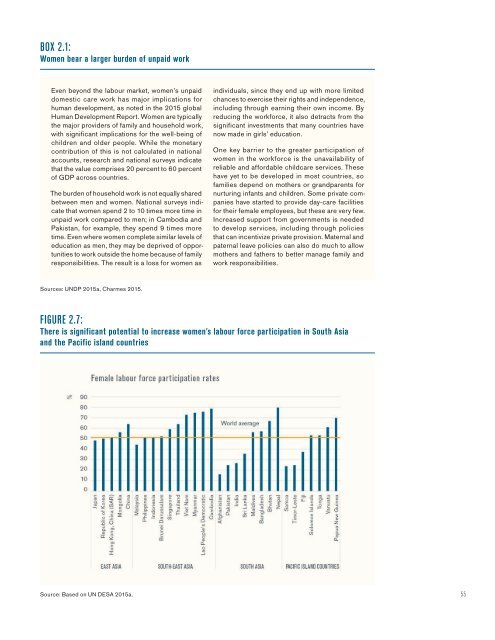SHAPING THE FUTURE HOW CHANGING DEMOGRAPHICS CAN POWER HUMAN DEVELOPMENT
23XELCz
23XELCz
You also want an ePaper? Increase the reach of your titles
YUMPU automatically turns print PDFs into web optimized ePapers that Google loves.
BOX 2.1:<br />
Women bear a larger burden of unpaid work<br />
Even beyond the labour market, women’s unpaid<br />
domestic care work has major implications for<br />
human development, as noted in the 2015 global<br />
Human Development Report. Women are typically<br />
the major providers of family and household work,<br />
with significant implications for the well-being of<br />
children and older people. While the monetary<br />
contribution of this is not calculated in national<br />
accounts, research and national surveys indicate<br />
that the value comprises 20 percent to 60 percent<br />
of GDP across countries.<br />
The burden of household work is not equally shared<br />
between men and women. National surveys indicate<br />
that women spend 2 to 10 times more time in<br />
unpaid work compared to men; in Cambodia and<br />
Pakistan, for example, they spend 9 times more<br />
time. Even where women complete similar levels of<br />
education as men, they may be deprived of opportunities<br />
to work outside the home because of family<br />
responsibilities. The result is a loss for women as<br />
individuals, since they end up with more limited<br />
chances to exercise their rights and independence,<br />
including through earning their own income. By<br />
reducing the workforce, it also detracts from the<br />
significant investments that many countries have<br />
now made in girls’ education.<br />
One key barrier to the greater participation of<br />
women in the workforce is the unavailability of<br />
reliable and affordable childcare services. These<br />
have yet to be developed in most countries, so<br />
families depend on mothers or grandparents for<br />
nurturing infants and children. Some private companies<br />
have started to provide day-care facilities<br />
for their female employees, but these are very few.<br />
Increased support from governments is needed<br />
to develop services, including through policies<br />
that can incentivize private provision. Maternal and<br />
paternal leave policies can also do much to allow<br />
mothers and fathers to better manage family and<br />
work responsibilities.<br />
Sources: UNDP 2015a, Charmes 2015.<br />
FIGURE 2.7:<br />
There is significant potential to increase women’s labour force participation in South Asia<br />
and the Pacific island countries<br />
Source: Based on UN DESA 2015a.<br />
55


